Monday Feb 16, 2026
Monday Feb 16, 2026
Thursday, 22 May 2025 01:46 - - {{hitsCtrl.values.hits}}
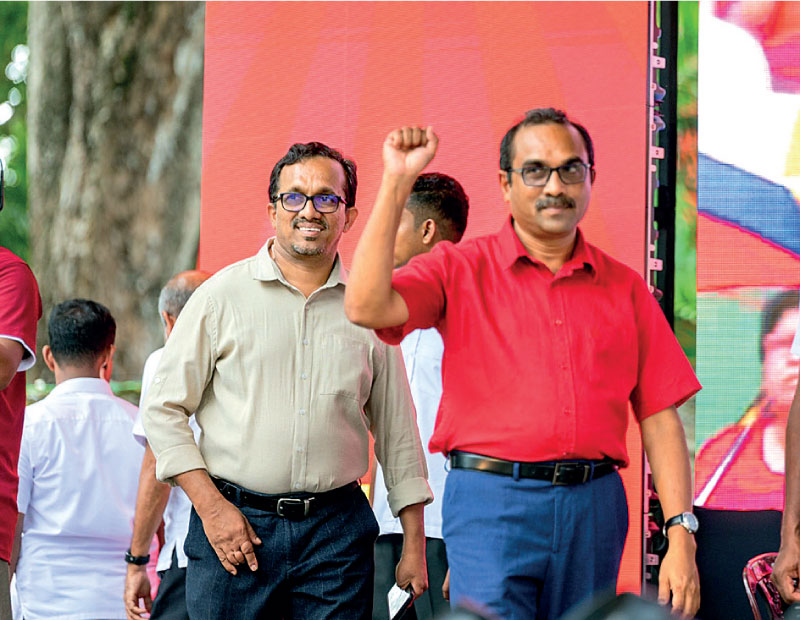
No speech for JVP theoretician Bimal Ratnayaka
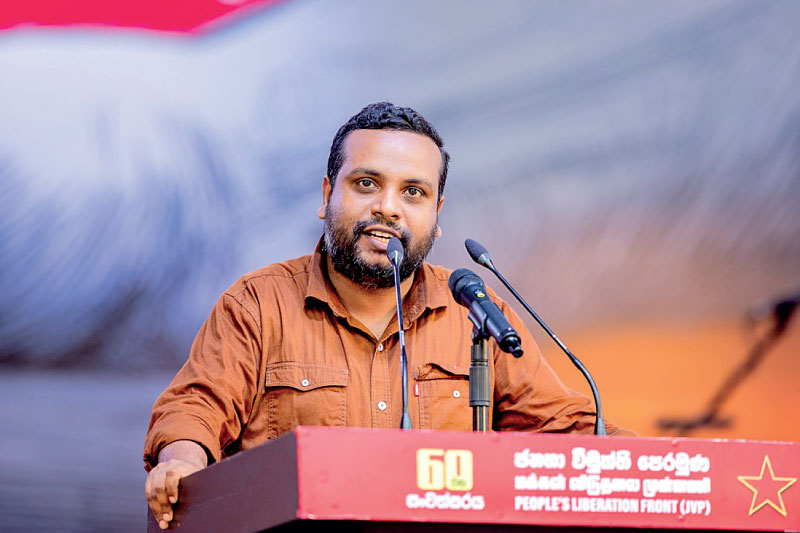
NPP’s Ramindu Perera theorises the JVP
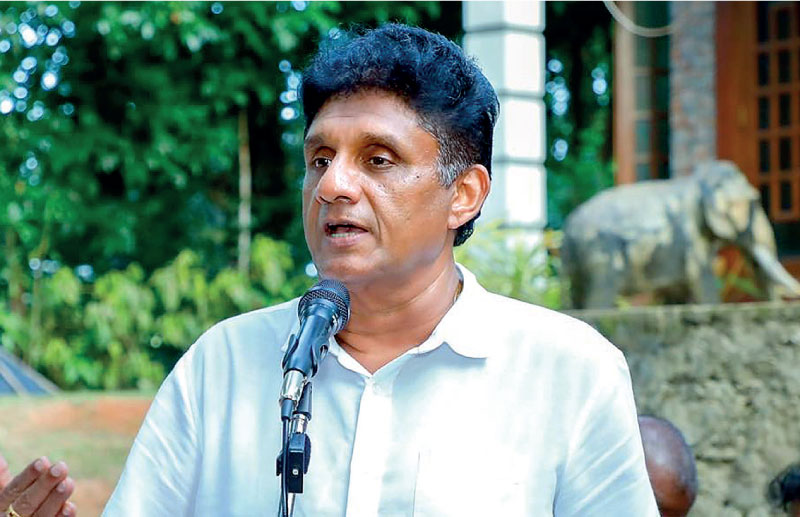
SP must coordinate and captain the Opposition
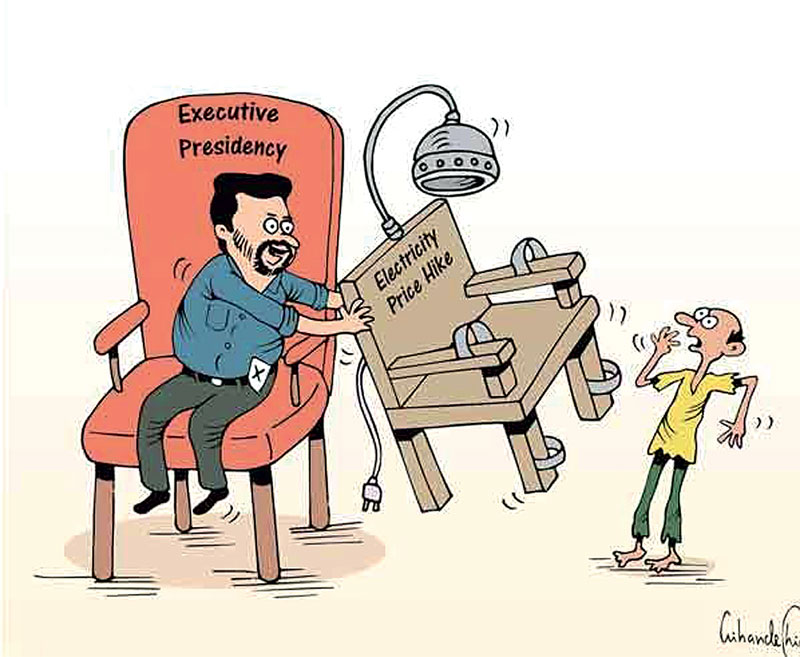
AKD’s shock therapy for citizens
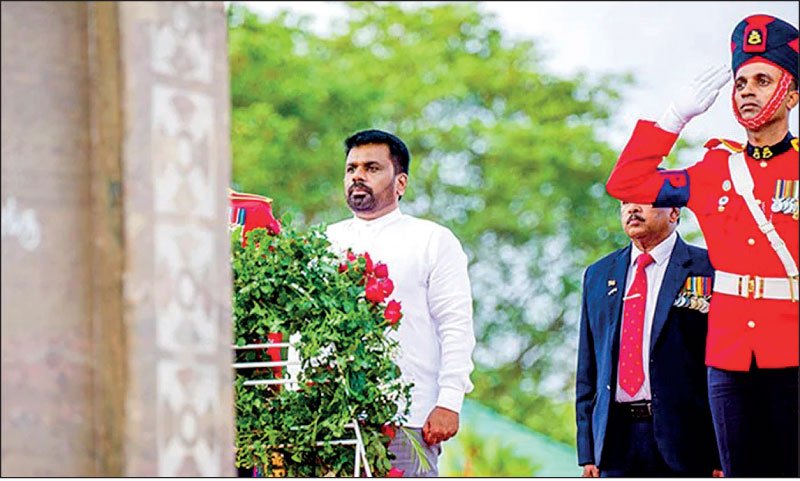
“Everyone fought the war with the aim of peace, not war” – AKD
 Imagine an event commemorating a landmark (e.g., Gettysburg) in the American Civil War in which 650,000 died, which fails to mention the prevention of secession, the preservation of the Union and the abolition of slavery?
Imagine an event commemorating a landmark (e.g., Gettysburg) in the American Civil War in which 650,000 died, which fails to mention the prevention of secession, the preservation of the Union and the abolition of slavery?
Imagine the celebration of the Chinese Revolution which despite the anti-Japanese war was mainly a civil war, which fails to mention the Kuomindang and the reactionary dictator Chiang Kai-shek?
Imagine the commemoration of Vietnam’s victory in 1975 which fails to mention imperialism, national liberation and victory over the US puppets in the South?
Imagine the 80th anniversary of the end of WW II failing to mention Nazi fascism?
Well, President and Commander-in-Chief Anura Kumara Dissanayake’s address at the war memorial on May 19th failed to mention Prabhakaran, separatism, terrorism, the magnificent defeat by the Sri Lankan military of a powerful enemy by any global standard, and the territorial reunification of the country.
AKD should have prepped himself by watch a video interview with a veteran of India’s special forces operations in Kashmir and Sri Lanka who confesses that the mighty Indian forces hardly stood a chance against the LTTE.
(1) Video | Facebook
That is the enemy the Sri Lankan military decisively defeated in their home territory, the Vanni jungles. Isn’t that an achievement to be proud of, for all time?
Going by President AKD’s speech, nothing great or positive was achieved by fighting the war and winning, instead of surrendering to Prabhakaran or losing. (https://www.ft.lk/top-story/President-calls-for-unity-peace-and-reconciliation-at-16th-War-Heroes-Commemoration/26-776676)
Obviously, for Anura there is nothing to celebrate. No great victory to be included in the long historical chronicle of Sri Lanka.
Let us be charitable and commend AKD on his abhorrence of bloodshed among citizens of one country. What then about the thousands of leftists and innocent citizens slaughtered by the JVP, from student leader Daya Pathirana to minor public servants who distributed voting cards, from Vijaya Kumaratunga to Prof Gladys Jayawardena? He didn’t have a word of regret and repentance about them at the JVP’s 60th anniversary commemoration.
Democracy vs. Dictatorship
Deng Xiaoping famously said “seek truth from facts”. What are the empirical facts of the LG election? A mathematically-gifted academic friend sent me this:
 Total Votes dropped only by 1,199,159, but NPP dropped by 2,364,256. This means the NPP dropped by more than the drop in the total vote.
Total Votes dropped only by 1,199,159, but NPP dropped by 2,364,256. This means the NPP dropped by more than the drop in the total vote.
Given the NPP’s greater vote-drop relative to the total vote-drop, AKD’s claim of a great victory remind me of Lenin’s acerbic line about “certain comrades who think that minus 3 is greater than minus 2”.
Why is Anura Dissanayake so aggressively insistent, including in his speech on the occasion of the JVP’s 60th anniversary, that the local authorities in which the NPP is the largest single party but does not command a majority, i.e. is in the minority, should also be governed by them?
It is the compulsion for political monopoly, rooted in the JVP’s history and collective mentality. It is the tendency to totalitarianism.
If Anura and the JVP-NPP can be quite so threatening over outcomes at a local government election, how will he act—indeed, how won’t he act-- when faced with reversals and defeats at Provincial Council, Parliamentary and Presidential elections?
The full re-enfranchisement of the citizens and the full re-democratisation of the Sri Lankan republic imperatively necessitates holding elections to the Provincial Councils. Let’s watch what Anura does.
Anura’s attitude, reinforced by his speech at the 60th anniversary event, reveal the character of his leadership and content of his political project. What came through in the speeches of AKD and the party’s General Secretary Tilvin Silva, is that they regard the JVP as a ‘chosen people’ or ‘chosen party’. They view the elections of 2024 not as an electoral victory which is reversible according to the vagaries of competitive, multi-party democratic politics, but as a triumph which is irreversible. Any setback either didn’t happen or is a restorationist conspiracy by the Old Establishment which must be crushed.
By threatening executive, legal and constitutional measures to forestall the Opposition from forming an administration in those Councils in which it has collectively nosed ahead of the government, Anura Dissanayake is threatening to change the rules of the democratic game.
The JVP-NPP leadership is hell-bent on seizing control of as many Councils as they can --not just those they have earned the right to-- for the purpose of entrenching one-party rule at the local level, which will pre-empt a strong ‘ground game’ by any Opposition party, combination of parties, or candidates at future national elections.
Leon Trotsky famously urged that ideologically and politically disparate forces should “march separately and strike together”. He didn’t insist that in order to legitimately “strike together” they should have marched together too. He also declared that in the face of rising Fascism he would unite “even with the Devil’s grandmother!” Thus, even Marxism legitimises united actions of diverse, even rival Oppositional forces.
From the viewpoint of Democracy, post-election coalitions are quite normal. At the last election to the National Assembly in France, Jean-Luc Mélenchon’s left party was the largest single element, but couldn’t assume the Prime Ministership and form a Government because it failed to cobble together a majority in the parliament.
The post-election process of coalition formation, displaying fluidity fuelled by the power of persuasion and negotiation, is inherent in the very stuff of political practice in the democratic world. That’s the magic of ‘the democratic marketplace’.
AKD-JVP-NPP are dangerously unfamiliar and uncomfortable with pluralist-democratic political practices, culture and ethos. As its 60th anniversary showed, the JVP has swallowed or crushingly dominates the NPP. The NPP is the ‘JVP Plus’, a mere puppet with no existence or spirit autonomous of the JVP.
Tupamaros or JVP?
Local news carried the footage of JVP and NPP leader, President Dissanayake’s speech at the celebration of the 60th anniversary of the founding of the JVP on the same day that the international media was covering the death of ‘Pepe’ Mujica, ex-President of Uruguay, former leader of the legendary MLN-Tupamaros urban guerrilla movement and an iconic political figure widely revered throughout Latin America. Brazil’s President Lula da Silva and Chile’s President Gabriel Boric were among those who personally paid their last respects at his coffin.
The Tupamaros and the JVP were born in the 1960s, part of the revolutionary New Left located mainly in the Third World (and Southern Europe). But they are as widely disparate as members of the same family or tribe can be, the JVP being Cain to the MLN-Tupamaros Abel.
For years after Sri Lanka’s diplomatic victory at the UNHRC Geneva in May 2009, I was still being asked the same question about the vote(s) of Uruguay’s ex-Tupamaro Government:
‘How did you get Uruguay, which voted for the holding of a Special Session on Sri Lanka, to vote in favour of Sri Lanka at the Special Session?’
I was always non-committal for tactical reasons, but can now tell the story. At the peer review of countries by the Human Rights Council (UPR), I intervened supportively during Uruguay’s review. The visiting Uruguayan Minister, a senior ex-Tupamaro, was struck by my close awareness of Latin America’s revolutionary history my published work on Fidel and Che and my own experiences. A bilateral meeting with me concluded with their support.
In his 60th anniversary speech Anura Dissanayake identified three factors as the secret of the JVP’s strength: “Conscience, Courage/Boldness, and Practical Knowledge” What does its splendid ‘Conscience’ say about the hundreds of leftists it murdered including Daya Pathirana, Vijaya Kumaratunga, Nandana Marasinghe, Jamis Athugala et al? The JVP was a twin of the Tigers, not a brother of the Tupamaros and remains unabashed.
Ramindu’s reconstruction
JVP theoretician Bimal Ratnayake did not speak at the 60th anniversary. Intelligent young academic Ramindu Perera, known to be an NPP ideologue rather than JVP—though that may have changed—was assigned the ‘theoretical’ speech. He stressed three points as cornerstones of the JVP’s unique success. His three theses were that:
i. Unlike Left parties which lined up with this or that international center, chiefly the USSR and China, the JVP adopted an autochthonous ‘Lanka line’.
ii. Unlike the traditional left which posited a progressive ‘national bourgeois’ SLFP and a reactionary ‘comprador’ UNP, the JVP held that both were reactionary, and therefore avoided the disastrous alliances the Old Left entered.
iii. Unlike Left parties the world over which entered into united fronts with other parties while giving leadership to mass organisations attached to the party, the JVP uniquely was a party which created a national political movement of a mass character.
Less than tenable, Ramindu’s rendition requires correction:
1.While it is true that the Sri Lankan Left, just as in many countries, polarised between Moscow and Beijing, the story cannot be caricatured into a binary model. There was a third centre: Fidel, Che, Cuba, the Tricontinental Conference and the OLAS, which espoused an autonomous revolutionary internationalist line. More broadly there existed a third space in the world socialist and revolutionary movement, consisting of states (e.g., Cuba, Vietnam, North Korea) which adopted an autonomous line while reserving the right to tilt to one or the other socialist Great Power on a case-by-case basis, and political vanguards which did the same (the CPI-M, the Japanese CP, and almost all of the Latin American Left).
These ‘third space’ states and movements shared a conceptual, theoretical, ideological and strategic universe which we may call Tricontinental Marxism. It had a pantheon of leaders, intellectuals and concepts. However, at no time did the JVP espouse these ideas or belong to this universe. It was an ‘outlier’, even an aberration, which opted for a disjointedly eclectic, exceptionalist line. It still is.
2.While it is true that the traditional left was wrong and the JVP correct about the SLFP/UNP, it was not the main reason for the Old Left’s catastrophe. As the JVP-NPP will learn, electoral elimination is less a function of political collaboration with the traditional parties than of the objective-material factor of socially painful economic performance. Had the LSSP-CP entered a coalition with SWRD Bandaranaike it wouldn’t have experienced the backlash it did (1977) after the coalition with Sirimavo in 1970.
Ironically and hypocritically, the JVP-NPP Government is currently locked in subservient economic class collaboration without political alliance with the old parties—embracing the IMF stabilisation package and debt repayment terms of the foreign creditors without renegotiation, and selling-out to the Indian state organically linked to Indian big capital.
3.The supposedly unique, creative contribution of the JVP’s model of building a national, mass political movement rather than a classic United Front, is a counterfeit claim. Both Left and Right had such a model many decades before the JVP-NPP. The link between the ‘small motor’ of Fidel’s guerrilla column and the ‘large motor’ of the July 26th Movement, the IRA-Sinn Fein nexus, the South African Communist Party’s embedding in the ANC (Mandela was an SACP member), the RSS-BJP axis, are but a few examples.
Ramindu Perera’s central point was that the JVP creatively applied Marxism which arose in the West, to Sri Lanka’s concrete reality. After a perfunctory nod to Lenin for pointing Marxism in the direction of the colonies and national liberation, he completely omits Mao Zedong, Ho Chi Minh, Antonio Gramsci, Fidel Castro and Che Guevara, and awards the ‘creative practical Marxism prize’ to Rohana Wijeweera.
For 40 years at least, the JVP’s discourse has been devoid of reference points to global left experiences, projects, ideas and leaders--contemporary or historical. (Tilvin’s quotes in his 60th anniversary speech are mostly imaginary).
Why the JVP will lose
In the necessary task of creatively applying Marxism to Sri Lanka, the JVP abandoned the universality of Marxism’s concepts in favour of Lankan exceptionalism, throwing the baby out with the bathwater. Let’s take just one example.
The Marxist theory of the United Front – which Mao referred to as one of ‘Three Magic Wands’-originates with Lenin and the 3rd Congress of the Communist International in 1921.
No united fronts, no victory over Fascism, no victorious national liberation struggles against imperialism.
After the collapse of Socialism in Europe/USSR, the ‘magic wand’ returned in modified form in Latin America as the ‘surfboard’ of ‘left populist’ Pink Tides 1.0 and 2.0. The ‘new united frontism’ was born in Latin America in the very year of the JVP’s premature 1971 insurrection. The Frente Amplio (Broad Front) founded in Uruguay was a front of political parties including those the MLN-Tupamaros had broken away from. Also in 1971, on an extended tour of Allende’s Chile, Fidel Castro preached the gospel of broad unity between all factions of the Left from the armed revolutionary MIR, to the Socialists, the Communists, and progressive Catholics.
Decades on Frente Amplio still exists, was the vehicle for the electoral victories of the MLN Tupamaros and Mujica, as well as template for Pink Tide 2.0 in Brazil, Mexico and Columbia.
For 60 years from 1965 to 2025, the JVP has engaged in fanatical, fundamentalist rejection of United Fronts.
Barring Peru’s Sendero Luminoso whose barbarism was very similar to the JVP’s in the late 1980s, the Latin American revolutionary left including the Tupamaros belonged to the Great Tradition of the 1960s-’70s revolutionary global left (embracing Italy and Portugal), while the JVP belonged to the Little Tradition or Lesser Tradition, and still does. The JVP and its leaders, starting with Wijeweera, don’t appear in any international, hemispheric, continental or regional pantheon.
How then did the JVP win? And why will it lose?
In an 11-page interview in the current issue of the compellingly impressive Jaffna Monitor, I recalled my reasoned warnings and predictions of failure and defeat of the LTTE, dating from 1982 to 2004. The Tigers rode roughshod over the doctrine and practice of People’s War. (https://www.jaffnamonitor.com/?r3d=15th-may-2025, pp. 39-51).
Similarly, I venture the following:
The JVP couldn’t have won anywhere but in Sri Lanka, because the country’s socio-cultural- intellectual ecology (to coin a phrase) changed over 70 years, making it exceptional. I identified the phenomenon 30 years ago, in my first book:
‘...The post-1956 situation in Sri Lanka is uniquely tragic in the Third World. Our anti-capitalist youth neither have a mother tongue which is widely spoken (e.g. Arabic, Spanish) nor do they know the language of the coloniser (Portuguese, French, English, Italian, German). The JVP thrives on this ignorance…the world view of the Sinhala youth who have neither the humanising influence of world literature available to them, nor the scientific rigour of Marxism…’
(Chapter 9, ‘The JVP and Pol Potism’, Sri Lanka, Travails of a Democracy, Unfinished War, Protracted Crisis, Vikas Publishing House, New Delhi, 1995, pp.95-107).
The JVP has won not only because it creatively applied Marxism to Sri Lanka’s specificity, but because the JVP’s exceptionalism incarnated the lamentable exceptionality that we have regressed—declined--to.
The JVP will lose, as it did twice before, because it is unscientific. In the dialectic of the organic and the universal, it fails to grasp universality --including of Democracy and Marxism-- as determinant, negating it egregiously instead.